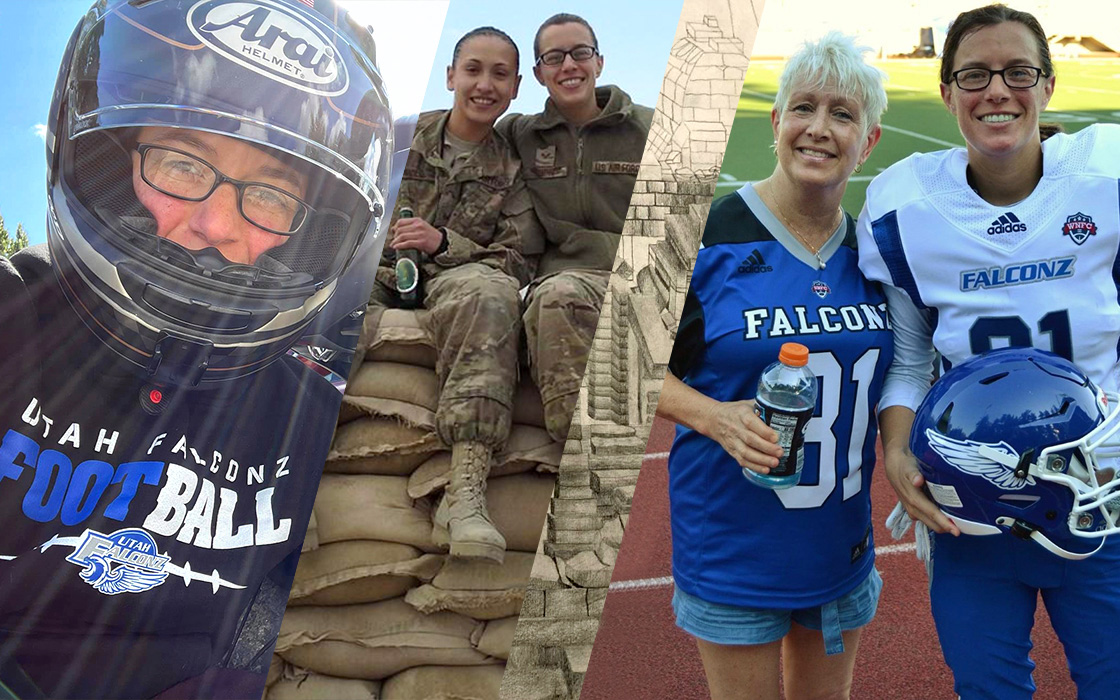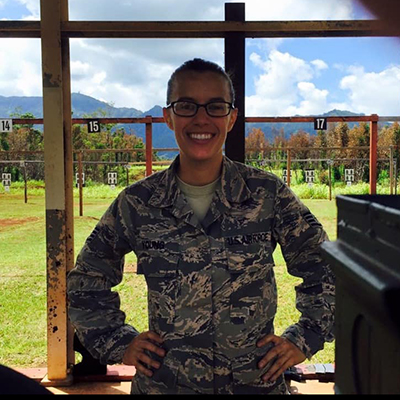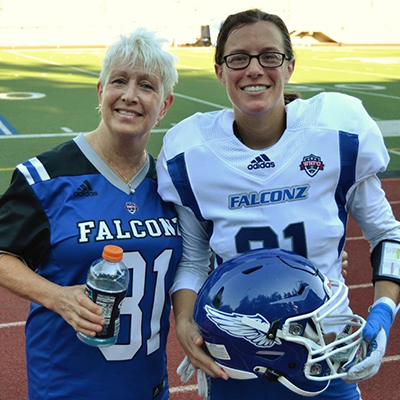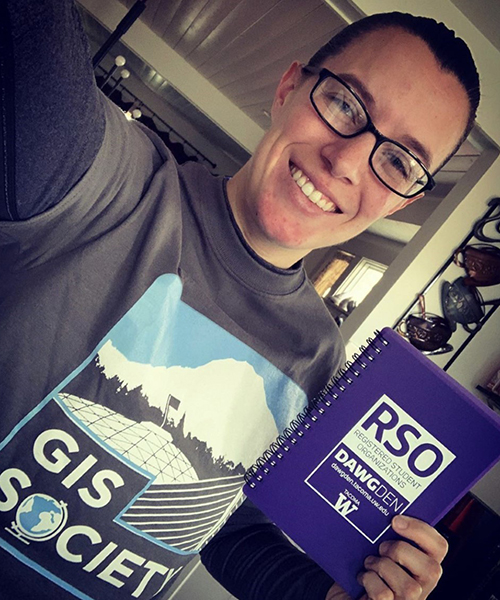
One Foot in Front of the Other
School and women's tackle football helped current UW Tacoma student Ashley Young find her way after her military career ended.
This Section's arrow_downward Theme Info Is:
- Background Image: ""
- Theme: "light-theme"
- Header Style: "purple_dominant"
- Card Height Setting: "consistent_row_height"
- Section Parallax: ""
- Section Parallax Height: ""
On the latest episode of Paw'd Defiance, the UW Tacoma podcast, Ashley Young talks honestly about her life in and after her military career, and how she regained a sense of purpose by going back to school and playing women's tackle football.
Strong and Durable. Not brittle or tender. Able to withstand adverse conditions. Can endure hardship or pain. Look up the word “tough” and this is some of what you’ll get. The word and its connotations tell a story of suffering. According to these definitions, one cannot be tough without experiencing some level of trauma.
In popular culture tough is often linked to one’s ability to overcome. The hero is tested but ultimately prevails. This is a trope. In real life success is not guaranteed. You can be tough and still get hurt. Rarely do we talk about the protagonist who makes it through but is scarred by the experience.
Ashley Young fits the model of what it means to be tough.
The Puyallup native struggled in high school. “It wasn’t for lack of ability,” she said. “It was from lack of motivation. I tried to get at least Cs in my classes so I could keep playing basketball,” she said.

Young graduated with a 1.76 GPA. “I had to go into the principal’s office and tell him why I should be allowed to graduate,” she said. “I never did any of the homework but I aced the tests.”
Young enrolled at Green River Community College the following autumn. Her college philosophy at that point mirrored her thinking in high school. Young made the Green River basketball team and did just enough academically to continue playing. Her hoop dreams ran up against reality. “I was a five-five point guard trying to go up against six-foot point guards,” she said. “I ended up only playing one season.”
Facing an uncertain future, Young decided to start over. She moved with a few of her friends to Florida. “I tried to get a job everywhere – McDonald’s, Walmart – but didn’t get any calls,” she said. Young grew up riding sport bikes and ending up finding work at a sport bike dealership in sales.
Young didn’t necessarily love her work in sales. Even so, the job paid the bills. She’d reached a level of stability in her life that can be hard to ascertain for someone in their early twenties. The financial collapse of 2008 changed things. People didn’t have a lot of discretionary wealth to play with and stopped purchasing things like sport bikes.
Young moved back to Washington. “I’d sworn off of ever tying another balloon to a windshield wiper again,” she said. “The only job I could find was in car sales.” It’s here, during one particularly sunny spring afternoon that Young decided she needed to make a lasting change. She was attaching balloons to cars when she got a text from her friends. They were at the fair and wanted her to join them. “In that moment, I thought ‘Wow, I don’t want to be here anymore.’”

There had been a nagging thought in Young’s mind for a while. Her grandfather served in World War II. At one point he also held the position of Pierce County Sheriff. “I’d always had this feeling that if I didn’t serve then I wasn’t doing my job,” she said. “If I didn’t try I would probably be upset with myself for the rest of my life.”
Military Career
Young decided to enlist in the U.S. Air Force. She knew she wanted to work in intelligence. Young understood that to do this she would first have to score high on the Armed Services Vocational Aptitude Battery (ASVAB). The ASVAB is a test that is used “to determine qualification for enlistment into the United States Armed Forces.” “I went to a local library and got an ASVAB study guide, because at this point I’d been out of school for six years,” she said. “I ended up scoring 96 out of a possible 99.”
A score this high meant that Young could essentially pick any career she wanted. “I chose Geospatial Intelligence Analyst,” she said. Young completed basic training and as well as a separate training specific to her role as an analyst. “I finished third in my class which is pretty cool for someone who barely graduated from high school,” she said.
Young ended up serving two tours in Afghanistan. In 2012 she was deployed to Bagram Air Base near the capital of Kabul. “I was a processing, exploitation and dissemination (PED) analyst,” she said. “I worked on manned and unmanned assets.” A big part of Young’s work involved analyzing live streams from drones in the area. “It was my job to provide the most accurate information to the battle space commanders,” she said. “I kept the boots on the ground informed.”
It seems strange that something as innocuous as getting lunch can end up impacting a person’s life. Young was on her way back from the mess tent one day when a sandstorm hit. “I started running as fast as I could but it overtook me,” she said. “It was like being in a dryer with a bunch of sand. Sand went up my nose, in my eyes and down my throat. I couldn’t breathe.” Young tried to find her way back but ended up stepping awkwardly on a rock. “My foot just snapped,” she said.
Young managed to limp to safety. The camp where she was stationed had limited medical resources. “I didn’t want to leave my team,” she said. “At night I would keep my foot up so I could sleep and during the day I would tie my boots as hard as I could.” Young did this every day for the next two months until her deployment ended.
Young, an Air Force Staff Sergeant, returned to the United States where her injured foot was surgically repaired. “The bones healed perfectly,” she said. Doctors set her foot in a cast and told her to stay off it as much as possible for at least 30 days.
A few days after the operation Young received a phone call from her commanding officer. He wanted to meet with her in-person and offered to send someone to pick her up. A car arrived a few minutes later. “He [Young’s commanding officer] told me that he had a very high-ops-tempo deployment in Afghanistan and that he needed someone who could handle a lot of pressure,” said Young.
Young agreed to take part in the mission. She spent the next few weeks and months in physical therapy in preparation for a physical fitness {PT) test which would determine if she was medically fit to return to the field. When the day came, Young woke early to soak her foot in a bucket of ice. She also took the military-issue grade 800-milligram ibuprofen. The PT test consisted of different parts, including a timed walk/run test. “I passed,” she said. “It was one of the most painful things I’ve ever done.”
The injured Young flew to North Carolina where she underwent two weeks of intense stress testing in order to become a certified Intelligence Tactical Controller (ITC). Young’s second tour of duty took her to Southeast Afghanistan. “This was a very mentally challenging deployment,” she said. Young finished her tour with a 96% mission success rate. “This was the highest success rate for an ITC and I believe my record still stands to this day,” she said.
The military-medically-retired Young in 2016. “I didn’t want to be medically retired, but my foot said otherwise,” she said. Transitioning back into civilian life proved difficult. “It’s the most surreal feeling to get back to the United States, driving in your car, going to the grocery store, or filling up with gas and these images come into your head, these flashbacks of you running with an M4 strapped to your chest,” said Young.

Young struggled with anxiety and a feeling of being directionless. “It’s hard to wake up and not have something that you’re contributing to when you’re used to being part of a team,” she said. Grief and loss also played a role in Young’s post-military life. She lost friends in Afghanistan. “Death is a very hard thing to talk about,” she said. “It’s a very intimate thing on both sides.”
‘Never Give Up’
Two things helped Young get back on her feet: school and women’s tackle football. She enrolled at TCC then eventually transferred to UW Tacoma. “I’ve always wanted to be a Husky,” she said. “I think that acceptance letter meant more to me than a lot of things in my life.”
Around the same time Young came across a flier for a Tacoma-based women’s football team. “I went to tryouts and I can tell you I wasn’t very good,” she said. Still, Young made the team. She played running back that season then switched to playing wide receiver for the Seattle Majestics the following season. “On defense I played free safety,” she said.
Young ended up playing football for six seasons. During her last season she played for the Utah Falconz and did her courses remotely. Young enjoyed the experience but feels the sport needs to be better supported. “We don’t get paid,” she said. “We work, we go to school. Some are married and have kids. If one of us gets hurt we have to take care of our own recovery.” Young is scheduled to have hand survey on December 8. The results of that operation will determine if she is able to continue playing football.
Young’s focus nowadays is on completing her degree in Urban Studies with a focus on GIS & Spatial Planning. “Urban Studies really interested me,” she said. “There are so many disciplines within the field that I could see myself being successful in, if I go that route.”
For her minor Young chose sports enterprise management. “I enjoy sports and wanted to take a look at the business side of things,” she said. During the past few months Young has struck up a friendship with Stan Emert, director of UW Tacoma’s Sports Enterprise Management program in the Milgard School of Business. “He’s been in my corner from day one,” said Young.

Young invited Emert to accompany her to the November 13 home football game between the Washington Huskies and Arizona State University Sun Devils. Young is being honored by UW at halftime with a “Hometown Hero” award for her actions on July 4 of this year. A tree caught fire in her neighborhood during the early morning hours and threatened to spread to nearby homes. Young alerted the homeowners and got them to safety before firefighters arrived. “When it comes to fight or flight situations, I don’t have flight, I just have fight,” she said.
Young isn’t sure what comes after graduation. She’s interested in using her skills as an analyst but she’s also drawn to the world of women’s sports. Her professional future may be uncertain, but Young knows one thing for sure. “I will be successful,” she said. “I currently have a 3.975 GPA and, if you would have told me that I’d do this well in college, I wouldn’t have believed you. Going to college has been night and day compared to my experience in high school. I love the upper-level of classes at UW Tacoma where you have the ability to apply theory and where your opinion about real-life matters are valued.”
Ashley Young is tough by any standard definition of the word. She’s also human. Broken bones mend. Scares fade, but some never fully disappear. “I will continue to put one foot in front of the other and I encourage others to do the same now matter how hard it feels in the moment,” she said. “Hold tight to that belief in yourself and you will overcome any challenges that come your way. Never give up.”
Recent news
Main Content
Gathering Strength
News Tags on this arrow_upward Story:
- None
Main Content
UW Tacoma Enrollment up 4% for Autumn 2024
News Tags on this arrow_upward Story:
- None
Main Content
Celebrating First Gen
News Tags on this arrow_upward Story:
- None



